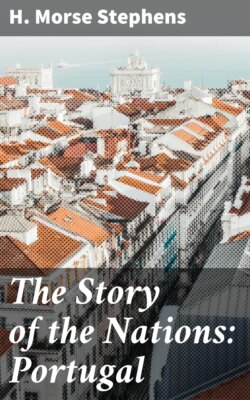The Story of the Nations: Portugal

Реклама. ООО «ЛитРес», ИНН: 7719571260.
Оглавление
H. Morse Stephens. The Story of the Nations: Portugal
The Story of the Nations: Portugal
Table of Contents
PREFACE
Genealogical Tables—
THE KINGS OF PORTUGAL
THE STORY OF PORTUGAL
I. EARLY HISTORY
II. THE COUNTY OF PORTUGAL
III. PORTUGAL BECOMES A KINGDOM. THE REIGN OF AFFONSO HENRIQUES
IV. PORTUGAL ATTAINS ITS EUROPEAN LIMITS
V. THE CONSOLIDATION OF PORTUGAL
VI. PORTUGAL DURING THE AGE OF EXPLORATION
VII. THE PORTUGUESE EXPLORERS
VIII. THE HEROIC AGE OF PORTUGAL
IX. THE PORTUGUESE IN INDIA AND THE EASTERN SEAS
X. THE PORTUGUESE IN BRAZIL
XI. THE LAST KINGS OF THE HOUSE OF AVIZ—DOM SEBASTIAN AND THE CARDINAL HENRY
XII. PORTUGUESE LITERATURE—CAMOENS
XIII. THE SIXTY YEARS’ CAPTIVITY
XIV. THE REVOLUTION OF 1640
XV. THE ENGLISH ALLIANCE
XVI. PORTUGAL IN THE EIGHTEENTH CENTURY. THE MARQUIS OF POMBAL
XVII. THE ERA OF THE FRENCH REVOLUTION—THE PENINSULAR WAR
XVIII. MODERN PORTUGAL. CIVIL WARS AND THE ESTABLISHMENT OF PARLIAMENTARY GOVERNMENT
INDEX
Footnote
Отрывок из книги
H. Morse Stephens
Published by Good Press, 2021
.....
In her efforts to promote the unity of Portugal and its independence of Gallicia, Donna Theresa was warmly seconded by her people, and especially by the inhabitants of the cities whom she favoured, while among the ruling classes she had the support of the clergy and the opposition of the greater part of the nobility. Most of her nobles owned great estates in both Gallicia and Portugal, for the feudal grants of land conquered by the Christian kings from the Mohammedans were generally made to noblemen, who had led large contingents to their help. These nobles were naturally opposed to a separation between Portugal and Gallicia, which would make them feudatories to two different lords, and often oblige them in case of disputes between their suzerains to sacrifice one of their properties. On the other hand, the Portuguese bishops were suffragans of the reconstructed archbishopric of Braga, and owed no obedience to any Gallician bishop; indeed, they were especially hostile to the wealthiest of them, the powerful bishop of the great pilgrim city of Santiago da Campostella. It has been said that many of the Christian bishoprics continued to exist during the Moorish occupation, and had a continuous history from the first conversion of the people to Christianity, but some had lapsed owing to the poverty of their sees. The advance of the Christian princes, which was due as much to religious as to political motives, brought about the re-establishment of the bishoprics which had lapsed, and the increased endowment of those which had continued to exist. The new bishops held a very different position from their predecessors. They were not the poor shepherds of poor flocks, in a land ruled by infidels, but powerful barons, holding great estates on military tenure, who united the influence of their sacred rank to their temporal power. The metropolitan of these Portuguese bishops was the Archbishop of Braga, and it was naturally his policy to support the independence of the county of Portugal, for it was better for him to be the head of the Church of an important county than to be merely one of the archbishops of the kingdom of Gallicia. This was the attitude taken up by the first great Archbishop of Braga, Mauricio Burdino, a Frenchman, and the companion in Palestine of Count Henry, who had promoted him from the bishopric of Coimbra to the metropolitan see. In it he was supported by Hugh, Bishop of Oporto, the most wealthy of his suffragans, and the history of the ensuing century gives many instances of the patriotism of the Portuguese bishops, and of their efforts to promote and maintain the independence of the new state.
COIMBRA. (PRESENT STATE.) (After a Photograph.)
.....